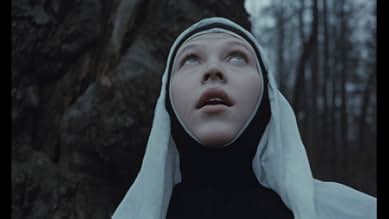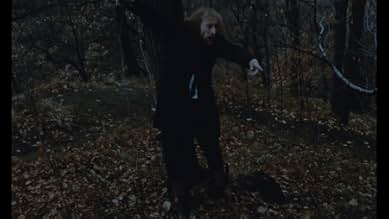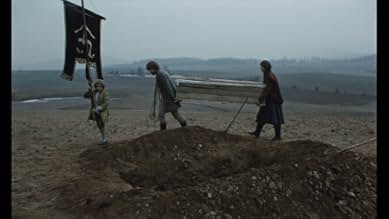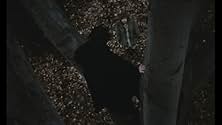IMDb रेटिंग
7.0/10
3.2 हज़ार
आपकी रेटिंग
अपनी भाषा में प्लॉट जोड़ेंYoung Polish noble Jakub, freed during 1793 Prussian invasion, experiences father's death, betrayal. Traumatized, he follows his savior, committing brutal murders across the country.Young Polish noble Jakub, freed during 1793 Prussian invasion, experiences father's death, betrayal. Traumatized, he follows his savior, committing brutal murders across the country.Young Polish noble Jakub, freed during 1793 Prussian invasion, experiences father's death, betrayal. Traumatized, he follows his savior, committing brutal murders across the country.
- निर्देशक
- लेखक
- स्टार
फ़ीचर्ड समीक्षाएं
Depravity, violence, a world permanently tipped off balance.
Near the end our halfmad protagonist asks someone else if he sees the world ugly because of his illness or because it is. The other replies that the world is filled with beauty, flowers, fruit, women, then reasons that he cannot adequately describe it. Instead he will dance about it.
His dance is not beautiful though, it's a wild spasmodic flailing of arms like we're seeing an epileptic suffer a seizure.
Diabel is that dance.
Superficially an allegory on how revolutions become mired in distraction - the political hedonism of power? - and how Poland has been used and abused by so many, deeper we find the same frightful pantomime that made Possession such a terrifying beast: inner soul made visible.
Slight problem is that he does not abstract enough to hit that bedrock were every image becomes multi-layered utterance of different cosmii. Characters remain pieces of the allegoric jigsaw, pawns in a game. There is not enough emptiness from life to pour into.
Near the end our halfmad protagonist asks someone else if he sees the world ugly because of his illness or because it is. The other replies that the world is filled with beauty, flowers, fruit, women, then reasons that he cannot adequately describe it. Instead he will dance about it.
His dance is not beautiful though, it's a wild spasmodic flailing of arms like we're seeing an epileptic suffer a seizure.
Diabel is that dance.
Superficially an allegory on how revolutions become mired in distraction - the political hedonism of power? - and how Poland has been used and abused by so many, deeper we find the same frightful pantomime that made Possession such a terrifying beast: inner soul made visible.
Slight problem is that he does not abstract enough to hit that bedrock were every image becomes multi-layered utterance of different cosmii. Characters remain pieces of the allegoric jigsaw, pawns in a game. There is not enough emptiness from life to pour into.
The devil epileptically dancing the beauty of the world in front of the eyes of a dying man, the victim of his deceit and evil schemes, how cruel, ironic and jaw-droppingly macabre that can be... and the dark blue unctuous atmosphere, the claustrophobic feeling that the mazy woods, the snow give despite the haywire dynamics in an open landscape, people like pawns spinning on a chessboard manipulated and controlled through their weaknesses by master puppeteers who use lust and envy and madness as levers of their domination, God represented by the constant presence of the nun, witnessing with a neutral frozen mercifulness the gyratory display of human delirium and the devil's catalytic actions.. I know now that only after seeing this sublime film and being impacted by it I've became a true Żuławski fan
Along with "The Silver Globe", this is my favorite Zulawski film. Why? Well, maybe because both of them are so utterly insane. Zulawski is hardly known here in the states, and the only film of his that is available domestically (thanks to Anchor Bay) is "Possession". Sad really but that's life. As the saying goes, the depth of an idea is inversely proportional to the mass perception. It isn't the case for many famous artists of course, but for Zulawski it rings true. I haven't seen any of the stuff he made while living in France (I understand that many of them are on the more erotic side of things) with the exception of the above-mentioned "Possession" and "The Importance of Love" (with Romy Schneider and Fabio Testi), which was definitely *something". I also watched Zulwaski's later effort "Szamanka" which I have no comment on because I viewed a bootleg copy in Polish with French subtitles, and I speak neither of the languages. The same basically goes for "The Silver Globe" actually, which, as far as I know, can only be seen in Polish with German subtitles. But damn it, this film (which was never even finished) was nuts with or without English subtitles. And so is "Diabel". which I was lucky enough to find WITH the English subs! Hooray!!! Why this movie scared both the erstwhile Polish communist authorities, who were highly confused by it and suspected that it carried hidden anti-government messages, and the Catholic Church, which was completely outraged for reasons quite obvious if you've seen the film, much more so than the secular authorities, is clear even thirty something years (made around 1972 and then shelved by the censors until the late 80's) after it was made. Human insanity, cruelty and depravity are all here on display, wrapped in a guise of a historical epic and punctuated by Zulawski's trademark chaotic camera work and overall delivery. Is the film excessive and gratuitously shocking? Yes! But why shouldn't it be? Zulawski was young (and surely angry) back then, and the things he was going up against were, still are, and have always been a thousand times more excessive. If you can't take it - oh well. Maybe you should pull the wool off your eyes and look around. Another reason why I chose "Diabel" and "The Silver Globe" as favs is because of the time and place. They were made in the then Eastern Block during the Cold War and on the director's native soil, which must count for something, right? - all of which might have(or not) added more poignancy to the films (don't tell that to Roman Polanski though).After you move to France, the Artist's paradise that it is, it becomes safe for you to do what you do. The chance to suffer for your art diminishes significantly. Although, of course, you could suffer financially instead, which is something many Eastern European film makers discovered after the ascent of the market economy. Then again, in the new world disorder things change rather quickly. The recent slaying of a Dutch film director (Theo van Gogh was his name, I believe) by Muslim extremists shows that an artist in need can still fully suffer if he wants to. Anyway, back to "Diabel" - I love it. It's not something to be taken lightly of course. As a friend of mine wistfully observed: "the scene where a guy gets shot in the face is one of the most memorable I've seen in any film. So jarringly sudden, I was literally shocked - I don't know why it affected my like that." And I suppose I'll just leave it at that. I mean, how often does that happen in this day and age? Blessed be the sick! Amen.
The previous poster calls the cruelty at display in this film "inhuman". Oh really? How come then that people slaughter people, gouge their eyes out, cut their limbs or burn them alive? Or torture them? Or rape and mutilate women? He should read some reports about practices during the Bosnian war or wars in Africa, about the stuff people have been doing to other people for ages, for reasons like religion, greed or lust. Or for no reasons at all. It took real "balls" or creative guts from the filmmaker to do a film like that. I am fed up with the political correctness and general blandness of films, caused by the requirements of market and profits, or by mere cowardliness. I could understand criticism of the cruelty if it was purely gratuitous but it is not. This film has artistic values and touches upon important topics. I am happy it was not destroyed and all copies not locked up somewhere. It could probably happen in Hollywood or in the lands like Iran.
During the joint Russian,German (Prussian) and Austrian invasion to Poland in 1793, a young Polish nobleman Jacob is saved from the imprisonment by a stranger who wants in return to obtain a list of Jacob's fellow conspirators. It is a bargain. Maybe implicitly, Jakub sold his life to this stranger, following his mysterious savior across the country, Jacob becomes a witness to chaos and moral corruption that is ensuing the partition and dissolution of Poland by the neighbor countries. People everywhere seems to gone mad and crazy, including Jacob's own family and his beloved girlfriend.
Being apparently demented by what he has seen, he, amidst his own delerium of his consciousness fading away, commits noumerus of gory and enigmatic killings derailing in social and political turmoil by mass murders, leading to insanity and desperation. This stranger, who acts as a guide, displays horrific sights of this physically and morally destroyed 18th-Century nation, whispering the actions of Jakub and acting as an evil motor. But there is free will in Jakub as well, which remains unquestionable.
The film was immediately banned by the censors of the then-communist Polish government and the director was soon forced to leave Poland. Almost two decades later, in the last days of communism in Poland, Zulawski have somehow obtained a copy of his film from censorship vaults and immediately presented it during nearest film festival in Tokyo in 1988. Albeit very late, the film premiere has had received a lot of applause from viewers and film critics alike.
Zulawski's invigorating style shines as brightly as ever, his vision of insanity displayed at every corner, its a world fueled by animal instincts and sexual deviance, permeated with enough filth to make the devil dance in joy. Where each frame is filled with details that are caught by the eye either consciously or subconsciously. Camera management is aggressive and intrepid, never giving up, never hesitating to the depiction of scandalous content, shifting tones and creating authentic psychological horror with remarkable success.
It is as ugly as it is mesmerizing. Andrzej Zulawski's cinema is the definition of madness, the real meaning of insanity, and the truth of the quest of craziness. This film Diabel is flawlessly made, perfectly filmed, completely insane, profoundly depicted. With the typical emotional attacks of anger and madness expressed by the various characters. He represents an absolute and incontrovertible chaos, subjecting the vision to a frenetic and frustrating horror. In Diabel, Zulawski seems to point out we should stop worrying about the Devil since it is already Hell on Earth...
Being apparently demented by what he has seen, he, amidst his own delerium of his consciousness fading away, commits noumerus of gory and enigmatic killings derailing in social and political turmoil by mass murders, leading to insanity and desperation. This stranger, who acts as a guide, displays horrific sights of this physically and morally destroyed 18th-Century nation, whispering the actions of Jakub and acting as an evil motor. But there is free will in Jakub as well, which remains unquestionable.
The film was immediately banned by the censors of the then-communist Polish government and the director was soon forced to leave Poland. Almost two decades later, in the last days of communism in Poland, Zulawski have somehow obtained a copy of his film from censorship vaults and immediately presented it during nearest film festival in Tokyo in 1988. Albeit very late, the film premiere has had received a lot of applause from viewers and film critics alike.
Zulawski's invigorating style shines as brightly as ever, his vision of insanity displayed at every corner, its a world fueled by animal instincts and sexual deviance, permeated with enough filth to make the devil dance in joy. Where each frame is filled with details that are caught by the eye either consciously or subconsciously. Camera management is aggressive and intrepid, never giving up, never hesitating to the depiction of scandalous content, shifting tones and creating authentic psychological horror with remarkable success.
It is as ugly as it is mesmerizing. Andrzej Zulawski's cinema is the definition of madness, the real meaning of insanity, and the truth of the quest of craziness. This film Diabel is flawlessly made, perfectly filmed, completely insane, profoundly depicted. With the typical emotional attacks of anger and madness expressed by the various characters. He represents an absolute and incontrovertible chaos, subjecting the vision to a frenetic and frustrating horror. In Diabel, Zulawski seems to point out we should stop worrying about the Devil since it is already Hell on Earth...
क्या आपको पता है
- ट्रिवियाThe film was banned in communist Poland.
- कनेक्शनFeatured in Brows Held High: Häxan (2012)
टॉप पसंद
रेटिंग देने के लिए साइन-इन करें और वैयक्तिकृत सुझावों के लिए वॉचलिस्ट करें
- How long is The Devil?Alexa द्वारा संचालित
विवरण
इस पेज में योगदान दें
किसी बदलाव का सुझाव दें या अनुपलब्ध कॉन्टेंट जोड़ें



























